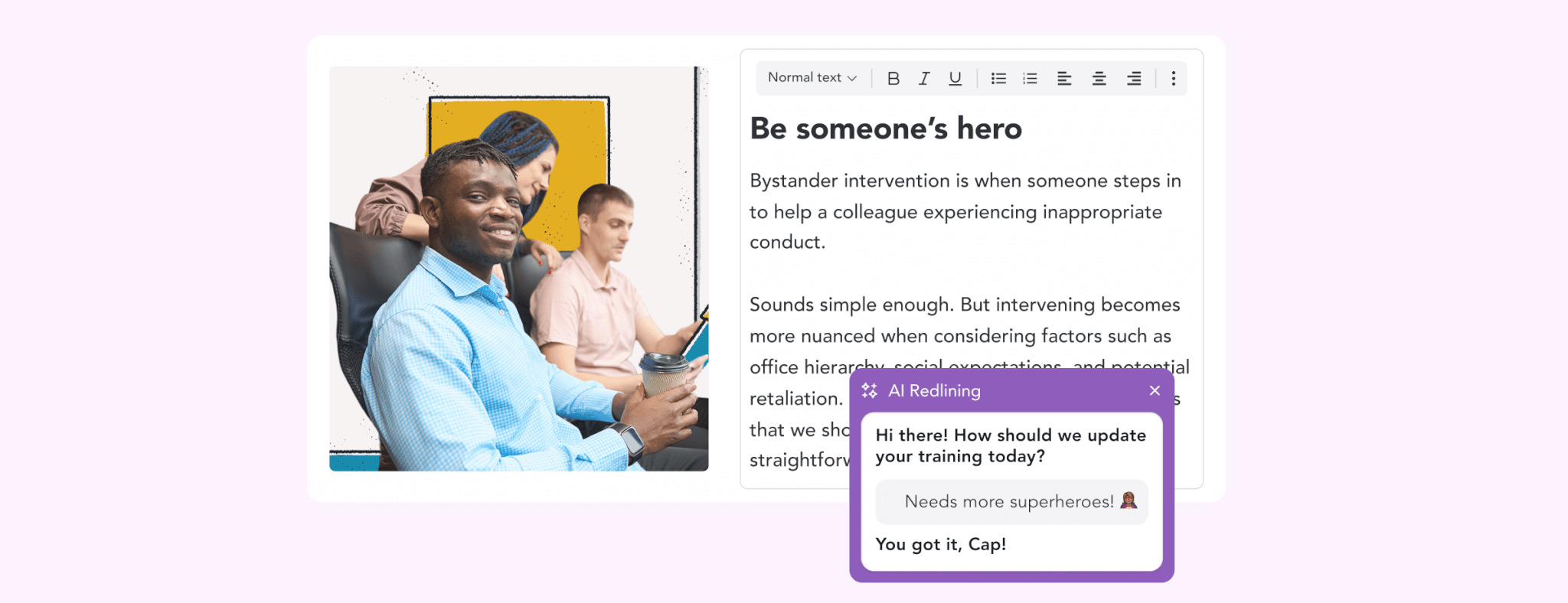Diversity, Equity, and Inclusion (DEI) training has become a common staple among organizational training programs across nearly every industry, and for good reason. Organizations that make Diversity, Equity and Inclusion a core part of their values and mission are transforming their workspaces into more accepting, respectful, and supportive communities where every individual employee can thrive and feel valued.
If you’ve been working in professional spaces in the past few years, there’s a decent chance you’ve had some exposure to DEI training. Or maybe you’re shopping around to find the DEI training that’s right for you (we recommend Ethena’s Diversity, Equity, & Inclusion course if you’re interested). Regardless of your exposure to DEI training, below, we’ll cover the basics of what DEI training is, how to frame its value to organizational leadership, and how to help your DEI training succeed.
What is DEI training?
Diversity, Equity, and Inclusion training gives employees the skills and knowledge they need to better understand, support, and celebrate their fellow coworkers with differing identities and backgrounds. Great DEI training prioritizes empathy and awareness for trainees, with an ultimate goal of building a healthy, thriving, inclusive and equitable workplace.

Why is DEI training important?
When it comes to making our workplaces (and world) more equitable and inclusive, we all have a responsibility to educate ourselves when we can. Training as a team, however, is an excellent way to set the standards for workplace behavior, communication, and expectations for one another in the workplace.
Let’s say you’re interested in implementing DEI training at your own workplace. What makes a convincing argument for DEI training?
The business case for DEI
If you’re reading this, there’s a good chance that you already have a sense of how DEI programs benefit a business financially. But getting exec buy-in and budget approvals for training are another obstacle altogether.
Below are a few main points to focus on in your next conversation:
- Diverse teams find solutions faster, and a more diverse team is more creative and resourceful in getting there.
- Organizations with great DEI programs attract and retain more top-talent employees.
- Employees have higher morale and work harder when they aren’t dealing with racial injustice in the workplace.
Spelling these things out may feel like common sense to some — and that’s a good thing — but if you point out the financial benefits to a good DEI program, you’re much more likely to get the attention your proposal deserves.
Additionally, let’s not forget the most important reason for Diversity, Equity, and Inclusion training . . .
It’s the right thing to do
Full-stop. We should invest in DEI because it’s our obligation as colleagues (and upstanding members of society) to do right by each other. That means taking a small amount of time to educate ourselves from time to time in order to create a safe and fair working environment where everyone feels valued, respected, and included, regardless of their identity. Diversity, Equity, and Inclusion training is an ongoing process, and great DEI training programs make regular training a part of their strategy. Ethena’s Diversity, Equity, & Inclusion course, for example, provides additional training modules designed to keep DEI lessons fresh year-round.

Who should participate in DEI training?
Everyone at your organization should be involved with DEI training. This applies doubly to company leadership, since leaders in an organization have a major impact on company culture. In other words, it’s important to lead by setting the best example out there.
DEI training topics
No two DEI courses are created the same, but there are a number of common topics that most DEI training sessions will be sure to cover. A few of these topics are:
- DEI Fundamentals - Defining Diversity, Equity, & Inclusion
- Identity and Intersectionality
- Microaggressions
- Bias and Unconscious Bias
- Bystander Intervention
- Allyship
You may already know what areas your organization needs to address most, but pay close attention to the needs of your team, as well as any areas with high risk of bias, like the hiring process, career advancement, and payroll.
Your overall goal with a DEI course is to give everyone the same foundational training content, enabling your team to have better conversations, know how to identify a problem and where to report it, and support each other with respect. Beyond this, you may consider additional training for management that gives guidelines and best practices for navigating hierarchical relationships.
Where DEI training often falls short
One common obstacle to DEI training’s effectiveness is lack of year-round consistency. If an organization does one annual training on DEI at the beginning of the year and forgets it for the remaining 11 months, it communicates that Diversity, Equity, and Inclusion isn’t a year-round concern for the organization. “Baking in” DEI training into regular parts of daily work life is one way to show that an organization cares about DEI values.
An additional hallmark of unsuccessful DEI training is training quality. Training, whether it’s in-person or online, should be both easy to access and engaging (and, hopefully, something to look forward to). The consequences of bad training are pretty staggering, and when training isn’t engaging, it is almost guaranteed that it won’t affect employee behavior. (And, in the case of sexual harassment training, bad training can actually cause an increase in harassment.) Luckily, there are a handful of training providers who tackle both of these pain points head-on. Ethena’s DEI Training course is designed with today’s teams (and their attention spans, and social media feeds) in mind. Ethena’s training contains a host of colorful content, from audio options, graphic novels, and fresh videos; and with Ethena’s automated, easy-to-use platform, admins can automatically onboard new team members and schedule refresher lessons year-round.
DEI training for employees
So if you’re looking for DEI training for your employees, look no further. Our engaging training that is research-backed and proven to train workplace behaviors is the DEI training you’ve been searching for. Request a sample training today to see it in action for yourself, or let’s talk to see if Ethena is right for your company!








